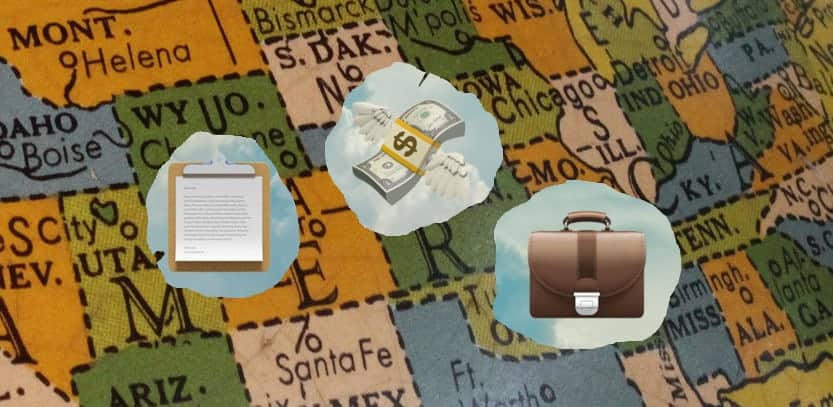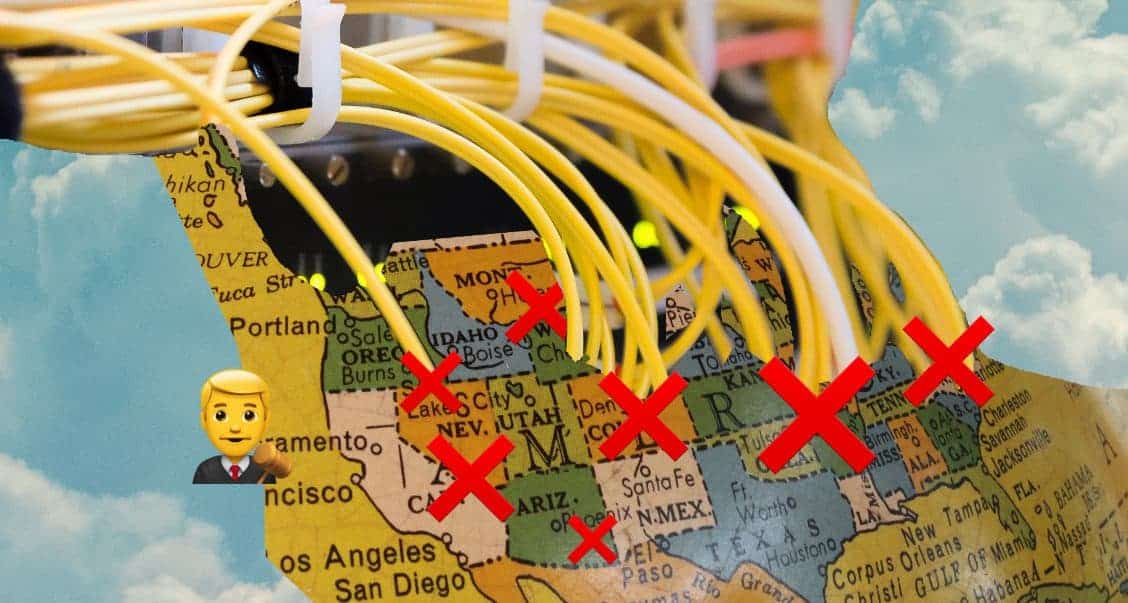More Than Half of States in America Are Opposing the FCC’s “Internet Freedom” Bill With Local Net Neutrality State Laws. Here’s Exactly How Those Laws Work.
Are you a journalist or researcher writing about this topic?
Contact us and we'll connect you with a broadband market expert on our team who can provide insights and data to support your work.
As a result of the FCC’s Restore Internet Freedom Order, elected officials have begun taking up the issue of net neutrality at the state level, with the goal of passing a variety of local-level Net Neutrality state laws.
So far, officials across 26 states have taken action aimed at preventing ISPs from engaging in throttling or blocking content or services, engaging in paid prioritization of traffic, or otherwise mismanaging data traffic traveling over broadband networks within state lines. Mayors in many cities have also signed a pledge to not engage in business with ISPs that violate Net Neutrality principles.
In both federal and state bodies of government, the net neutrality debate falls along party lines, with Democrats in favor of rules enforcing net neutrality, and Republicans favoring a hands-off approach to the issue.
State-Level Pro-Net Neutrality Regulatory Strategies

First Strategy: Suing the FCC
Following the FCC’s vote, 22 Attorneys General, led by New York’s Attorney General Eric Schneiderman, have filed a suit against the FCC, asking the court to find the Restore Internet Freedom Order as “arbitrary, capricious, and an abuse of discretion.” The suit follows an investigation into allegations of fake comments in support of the repeal appearing on the FCC’s public comment Website. The investigation was carried out by the New York’s AG office.
States suing the FCC as of February 23, 2018: California, Connecticut, Delaware, Hawaii, Illinois, Iowa, Kentucky, Maine Maryland, Massachusetts, Minnesota, Mississippi, New Mexico, North Carolina, New York, Oregon, Pennsylvania, Rhode Island, Vermont, Virginia, Washington and District of Columbia.
Second Strategy: Enhancing requirements for state or government grants
Legislators in 12 states have introduced legislation which would require ISPs to adhere to a set of net neutrality rules in order to be eligible for state and local government and agency contracts.
States pursuing enhanced grant requirements as of February 23, 2018: California, Illinois, Kansas, Maryland, Minnesota, Montana, New York, Oregon, Pennsylvania, Rhode Island, South Dakota, Wisconsin.
Third Strategy: Direct State-Level Net Neutrality Rules
In 20 states, officials have introduced legislation that would create a set of net neutrality principles that ISPs offering broadband service to residents and business within the state must follow. Here, state approaches vary: some bills outline the creation of a certification process for ensuring ISPs are maintaining net neutrality, others hand over enforcement authority to different state bodies, and some identify violation fines.
States pursuing this strategy as of February 23, 2018 include: Alaska, California, Connecticut, Georgia, Hawaii, Idaho, Massachusetts, Nebraska, New Jersey, New Mexico, New York, Pennsylvania, Rhode Island, South Carolina, Tennessee, Vermont, Virginia, Washington, West Virginia and Wisconsin.
Click state name to jump to legal data
State-by-State Net Neutrality Legal and Legislative Action
Alaska State Net Neutrality Laws
Alaska Broadband Map
Alaska state Rep. Scott Kawasaki (D) introduced House Bill 277, with six Democrat cosponsors, which establishes Net Neutrality state laws for any ISP operating within the state. Under Alaska state law, ISPs are already considered utilities. The bill is currently in committee.
California State Net Neutrality laws
California Broadband Map
Two state Senators are tackling the issue with two different pieces of legislation in California. Senate President Pro Tem Kevin De León (D) introduced Senate Bill 460, the California Internet Consumer Protection and Net Neutrality Act of 2018, which would create a set of net neutrality rules that ISPs operating within the state must follow, and which bars state agencies from entering into contract with any ISP unless the ISP certifies, under penalty of perjury, to adhere to net neutrality rules. Fellow state Sen. Scott Wiener (D), along with 13 other Democrats, introduce Senate Bill 822, that would enable the state’s Public Utilities Commission (CPUC) to establish new regulations on how ISPs treat Internet traffic. Bill 822 is notable for being the strictest of current proposed or passed laws, attacking practices like zero rating of traffic as well as reintroducing the basic principles of Obama-era FCC legislation. Both bills are still in committee.
Colorado State Net Neutrality laws
Colorado Broadband Map
No legislation has been introduced at the state level, though two Democrat representatives, Rep. Leslie Herod and Rep. Chris Hansen, have told local media they’re working on a solution. These two legislators have also called for Colorado’s state Attorney General, Cynthia Coffman (R) to join the multi-state suit against the FCC.
Connecticut State Net Neutrality laws
Connecticut Broadband Map
Connecticut state Sen. Bob Duff (D) introduced a placeholder Senate Bill 2 that would hold ISPs accountable to net neutrality pledges by creating a certification process to ensure ISPs do not engage in blocking, throttling or prioritizing Internet traffic within the state. The bill would also give the state’s Public Utilities Regulatory Authority the ability to enforce net neutrality within the state with civil penalties. The bill is currently still in committee.
Connecticut’s Attorney General George Jepsen (D) announced in January that the state will be joining others in suing the FCC.
Delaware State Net Neutrality laws
Delaware Broadband Map
Delaware state Sen. Delcollo (R) introduced Senate Concurrent Resolution 44 establishing the General Assembly’s opposition to the FCC’s repeal of net neutrality rules. The resolution also urges Congressional members to “enact legislation reinstating and requiring the preservation of net neutrality.” The resolution, which had four Republican and nine Democrat cosponsors was passed January 25 with bipartisan support.
Delaware Attorney General Matt Denn (D) announced in January that the state would join others in suing the FCC.
Georgia State Net Neutrality laws
Georgia Broadband Map
Georgia state Sen. Harold Jones (D) introduced Senate Bill 310, with six Democrat cosponsors, aimed at preserving the open Internet by barring ISPs from blocking or throttling content, applications or services in broadband service offered in the state. The bill is currently in committee.
Hawaii State Net Neutrality laws
Hawaii Broadband Map
Both the state House and Senate are now considering their own versions of Net Neutrality state laws or legislation aimed at forcing ISPs to comply with net neutrality principles. State Sen. Stanley Chang (D) and six other Democrats introduced Senate Bill 2088, which would require ISPs operating within the state follow net neutrality principles. After a public hearing, the bill has been deferred.
In the state’s House, Rep. Kaniela Ing (D) and seven Democrat cosponsors introduced House Bill 1995, which would establish a set of net neutrality principles that ISPs operating within the state must follow, and seeks to establish a task force to “explore the possibility of establishing a state-owned public utility company to provide broadband internet service.” The bill is currently in committee.
Idaho State Net Neutrality laws
Idaho Broadband Map
Idaho state Rep. Paulette Jordan (D) has proposed House Bill 425, a bill that prohibits ISPs operating within Idaho from “blocking lawful content, applications, services or nonharmful devices, subject to reasonable network management,” as well as prohibits them from “impeding or degrading” lawful traffic, and can not engage in paid prioritization.” The bill is currently in committee.
Illinois State Net Neutrality laws
Illinois Broadband Map
Illinois state Rep. Ann Williams (D) and four Democrat cosponsors filed House Bill 4819, entitled the “Broadband Procurement and Disclosure Act,” which bars state contracts from being awarded to ISPs “unless the contract provides specified terms concerning access to and impairment of Internet services.” The bill is currently in committee.
Iowa State Net Neutrality laws
Iowa Broadband Map
No legislation has been introduced at the state level, but local media has reported that lawmakers are currently drafting a net neutrality bill. Iowa’s Attorney General Tom Miller joined the multi-state lawsuit against the FCC.
Kansas State Net Neutrality laws
Kansas Broadband Map
State Rep. Brett Parker (D) introduced House Bill 2682, which proposes requiring ISP entering into contracts with the state to honor net neutrality rules. This bill would also require ISPs to disclose to its customers its network management practices, “for consumers to make informed choices regarding the use of such services.” The bill’s cosponsors include four Democrats and one Republican. The bill is currently in committee.
Kentucky State Net Neutrality laws
Kentucky Broadband Map
Attorney General Andy Beshear has joined the multi-state suit against the FCC.
Louisiana State Net Neutrality laws
No legislators have introduced any bills to the state body. Local media has reported that Louisiana Governor John Bel Edwards (D) is mulling an executive order to address the issue.
Maine State Net Neutrality laws
Maine Broadband Map
Maine Attorney General Janet Mills (D) has joined the FCC lawsuit.
Maryland State Net Neutrality laws
In January, Maryland state Sen.Roger Manno (D) and five other Democrats introduced Senate Bill 287, which would restrict state funds that can be used in contracts with ISPs who do not adhere to net neutrality principles such as blocking lawful content, throttling speeds or engage in “commercial traffic preferencing.” Maryland Attorney General Frosh (D) has joined the multi-state suit against the FCC.
Massachusetts State Net Neutrality laws
Massachusetts Broadband Map
Massachusetts state Sen. Barbara L’Italien (D) and state Rep. Andy Vargas (D) introduced two versions of a bill entitled “Act Protecting Consumers by Prohibiting Blocking, Throttling, or Paid Prioritization in the Provision Of Internet Service,” in December 2017, just days after the FCC’s vote. L’Italien introduced Senate Bill 2428 to the state Senate, while Rep. Vargas introduced House Bill 4151 to the State House of Representatives. Both bills aim to devise a set of net neutrality rules for ISPs operating within the state, and give authority of enforcement to the state’s Attorney General, under the Massachusetts Antitrust Act.
State Senators have convened a special committee aimed at developing legislation to protect net neutrality rules in response to the FCC’s repeal. The bipartisan Special Committee on Net Neutrality and Consumer Protection, led by Rep. Cynthia Creem (D), Senate Minority Leader Bruce Tarr (R) includes four other Democrats and one Republican.
According to local media reports, state Sen. Jamie Eldridge (D) plans to introduce a similar bill that would require all ISPs operating in Massachusetts follow net neutrality rules. Governor Charlie Baker is also reportedly considering releasing an executive order on the issue.
Massachusetts Attorney General Maura Healey (D) has joined the multi-state suit against the FCC.
Minnesota State Net Neutrality laws
Minnesota Broadband Map
State Rep. Paul Thissen (D) and Sen. Ron Latz (D) announced plans to introduce legislation that would require ISPs to “ensure neutrality on all public networks” by prohibiting blocking, throttling and paid prioritization schemes from ISPs in local and state contracts. The bill will also seek to ensure that Minnesota state agencies “favor companies that agree to abide by net neutrality principles.” The bill has not yet been formally introduced the state Senate. Minnesota Attorney General Lori Swanson (D) has joined the multi-state lawsuit against the FCC.
Mississippi State Net Neutrality laws
Mississippi Broadband Map
Mississippi Attorney General Jim Hood (D) has joined the multi-state suit against the FCC.
Montana State Net Neutrality laws
Montana became the first state to respond to the FCC’s repeal. Montana Gov. Steve Bullock (D) signed an executive order that require ISPs with state contracts to follow net neutrality principles. The order directs the state’s Department of Administration to “incorporate into the state procurement process for Internet, data, and telecommunications services criteria requiring that successful recipients of state contracts adhere to Internet neutrality principles.”
Nebraska State Net Neutrality laws
Nebraska Broadband Map
Nebraska state Sen. Adam Morfeld (D) introduced Legislative Bill 856, which would change communications provider requirements under the Nebraska Telecommunications Regulation Act in order to prevent ISPs from blocking, throttling or otherwise impacting data traffic in Nebraska. The bill is awaiting a public hearing.
New Jersey State Net Neutrality laws
New Jersey Broadband Map
State legislators Nilsa Cruz-Perez (D) and Patrick Diegnan (D) introduced Senate Bill 1577, the “New Jersey Net Neutrality Act,” which prevents any ISPs in New Jersey from blocking or throttling traffic, or engaging in paid prioritization, in services offered to residents and businesses. An identical bill, Assembly Bill 5257, was introduced in the state Assembly, sponsored by Annette Quijano (D) and five other Democrats.
New Jersey Governor Phil Murphy issued an executive order in early February which requires ISPs with state contracts to adhere to net neutrality principles.
New Jersey Attorney General Gurbir S. Grewal has joined the multi-state suit against the FCC.
New Mexico State Net Neutrality laws
New Mexico Broadband Map
New Mexico state senator Howie C. Morales (D) introduced Senate Bill 39 that would modify the state’s Unfair Practices Act to ensure that ISPs do not block or throttle traffic, or engage in paid prioritization. The bill is currently in committee. Morales, along with Rep. Bill McCamley (D) and Rep. Carl Trujillo (D) also introduced a Joint Memorial “requesting that the New Mexico Congressional Delegation encourage Congress to review the FCC’s decision to repeal the net neutrality rule and the FCC’s rulemaking process.” New Mexico’s Attorney General Hector Balder (D) has joined the multi-state suit against the FCC.
New York State Net Neutrality laws
New York Broadband Map
New York Sen. David Carlucci (D) and Assemblywoman Patricia Fahy (D) filed two versions of a bill that introduces a set of requirements for ISPs operating within the state to meet in regards to net neutrality. Senate Bill 7183 would also modify the state’s public service law to include ISPs, and would task the Commission to “develop and maintain a statewide plan for the monitoring of internet service providers, including the annual certification that internet service providers comply with the internet service neutrality requirements.” The bill would amend the state finance law to bar ISPs that do not uphold net neutrality rules from obtaining state and local contracts.
The Assembly version of the bill has seen 38 other legislators sign on as co-sponsors, including Independent Fred Thiele and Republican Karl Brabenec.
New York Governor issued an executive order in January directing state agencies “not to enter into any contracts for internet service unless the ISPs agree to adhere to net neutrality principles.”
New York State attorney general Eric Schneiderman has filed suit against the FCC, along with 20 other state Attorneys General. The announcement came after the AG’s office released its findings of an investigation into the FCC’s commenting process on the issue of net neutrality. The investigation found up to 2 million comments were submitted to the FCC fraudulently, using the names of real US citizens.
As of May 2018, New York is reported to be considering similar legislation as California in regards to the practice of zero-rating among LTE providers.
Oregon State Net Neutrality laws
Oregon Broadband Map
State Rep. Jennifer Williamson (D) and Rep. Paul Holvey (D) have included net neutrality protections into an online privacy bill filed last year, House Bill 4155. The bill would bar the State of Oregon from awarding contracts to ISPs who do not adhere to net neutrality principles. The bill, which has 24 Democrat cosponsors, was signed into law by Governor Kate Brown (D) April 2018.
Pennsylvania State Net Neutrality laws
Pennsylvania Broadband Map
State Sen. Larry Farnese (D) introduced Senate Bill 1033, the Open Internet Protection Act, which would prohibit ISPs from blocking, throttling traffic or engaging in paid prioritization schemes. The bill would also bar and state agency or “political subdivision” from doing business with, offering tax credits or awarding grants to ISPs who do not adhere to net neutrality; and ISPs that do not comply with these regulations would be found in violation of the state’s Unfair Trade Practices and Consumer Protection Law. The bill, which has three Democrat cosponsors, is currently in committee. Pennsylvania Attorney General Josh Shapiro (D) has joined the multi-state suit against the FCC.
Rhode Island State Net Neutrality laws
Rhode Island Broadband Map
State Rep. Aaron Regunberg (D) introduced House Bill 7422, the Net Neutrality Protection Act of 2018, which bars state agencies from purchasing Internet service from ISPs that “fail to provide unbiased access to the Internet, through a commitment to the net neutrality principles.” The bill, which has three Democrat and one Republican cosponors, is currently in committee. Rep. Brian Kennedy (D), meanwhile, introduced House Bill 7076, a bill that would amend the state’s “Community Antenna Television Systems” general laws to include regulations and jurisdiction for ISPs who are awarded contracts by the state or local bodies to enforce compliance with the state’s net neutrality rules. The bill, which has four Democrat cosponsors, is currently in committee. On the Senate side, Sen. Louis DiPalma introduced Senate Bill 2008, which extends the net neutrality rules to any ISP offering broadband service in the state. The bill is currently in committee. Rhode Island Attorney General Peter Kilmartin (D) has joined the multi-state suit against the FCC.
South Carolina State Net Neutrality laws
South Carolina Broadband Map
State Rep. J.E. Smith (D) introduced House Bill 4706, the South Carolina Net Neutrality Protection and Maintenance Act, which would prevent any ISP operating in the state from engaging in blocking, throttling or paid prioritization. Failure to adhere to the state’s net neutrality principles “constitute an unfair or deceptive act in trade or commerce and an unfair method of competition,” the bill declares. The bill is currently in committee.
South Dakota State Net Neutrality laws
South Dakota Broadband Map
State Sen. Reynold Nesiba (D) and 11 other Democrats introduced Senate Bill 195, which would prevent state and local agencies from awarding contracts to ISPs that do not adhere to net neutrality principles. The bill is currently in committee.
Tennessee State Net Neutrality laws
Tennessee Broadband Map
State Sen. Lee Harris (D) introduced Senate Bill 1746, the Tennessee Internet Consumer Protection and Neutrality Act. State Rep. John Ray Clemmons (D) introduced the same bill as House Bill 1755 in the state’s House of Representatives. The bills prohibit any ISPs operating in the state to engage in throttling, blocking or paid prioritization, and also prevents states agencies from contracting with ISPs that fail to adhere to the net neutrality principles.
Both bills are currently in committee.
Vermont State Net Neutrality laws
Vermont Broadband Map
Vermont Rep. Thomas Stevens (D), Rep. Laura Sibilia (I) and Rep. Matthew Hill (D)
introduced House Bill 680, which aims to establish “consumer protection and net neutrality standards applicable to Internet service providers in Vermont.” The bill, which has 41 cosponsors that include Democrats, Independents, Progressives and one Republican, would require all ISPs operating in the state to obtain a net neutrality certificate, administered by the Vermont Public Utility Commission in order to provide broadband service to residents within the state. It would also create a “ground truth” testing mechanism, in order to “create a single objective statewide Internet speed test that permits customers to test their own broadband Internet speed and submit the results to the [public utility commission] to determine what Internet speeds consumers are receiving and where Internet service providers may be blocking,impairing, or degrading Internet traffic or content.” The bill would see the net neutrality standards enforced under the state’s Consumer Protection Act. The bill is currently in committee.
Virginia State Net Neutrality laws
Virginia Broadband Map
Virginia Rep. Lee Carter (D) introduced House Bill 705 in early January aimed at preserving net neutrality within the state. The full bill reads: “A provider of broadband services shall be prohibited from offering or renewing services to consumers within any locality in the Commonwealth in which certain media is throttled, blocked, or prioritized on the basis of its content, format, host address, or source.” The bill died in committee last week.
Washington State Net Neutrality laws
Washington Broadband Map
As of February 27, 2018, Washington is the first state to successfully pass a state law specifically stipulating that ISPs cannot throttle, block, or prioritize traffic. The law applies to wired as well as wireless carriers.
State Rep. Drew Hansen introduced House Bill 2282 in early January, which would bar any ISP operating in the state from blocking, throttling or engaging in paid prioritization. The bill would see that net neutrality principles “are matters vitally affecting the public interest for the purpose of applying the consumer protection act,” and gives the state’s Attorney General the power to enforce those rules. The bill, which had six Republican cosponsors and 45 Democrat cosponsors, passed the state’s House with bipartisan support and is now being considered by the state Senate. The bill passed committee and was approved by the state legislature on February 9 of 2018 before passing into law on February 27, 2018.
West Virginia State Net Neutrality laws
West Virginia Broadband Map
State Sen. Richard Ojeda introduced the West Virginia Net Neutrality Act, to prohibit ISPs from blocking, throttling or engaging in paid prioritization. It also deems violations of these rules to “an unfair or deceptive act or practice” in violation of the West Virginia Consumer Credit and Protection Act. The bill would enable consumers to bring suit against ISP violators in private civil action. The bill has 10 Democrat cosponsors and one Republican cosponsor, Patricia Rucker. However, Rucker has since requested to be removed from the list. The bill is currently in committee.
Wisconsin State Net Neutrality laws
Wisconsin Broadband Map
State Sen. Jon Erpenbach (D) and Rep Jimmy Anderson (D) have introduced Assembly Bill 908 that would prevent the state agencies from awarding contracts to ISPs that do not adhere to net neutrality principles. A similar bill, Senate Bill 740, was introduced to the state Senate by Sen. Erpenbach and Sen. Chris Larson (D), with 18 Democrats. Sen. Larson (D) and Rep. Jonathan Brostoff (D), along with 16 other Democrats, have also introduce Assembly Bill 909, which would reinstate net neutrality rules for ISPs operating within the state, and directs the state’s Department of Agriculture, Trade and Consumer Protection to “create and implement a complaint process for responding to violations of the bill’s provisions.” All three bills are currently in committee.
Context of the “Net Neutrality” vs “Internet Freedom” Partisan Debate

After a heated national debate about the importance of net neutrality enforcement, the FCC voted 3–2 along party lines to adopt the Restore Internet Freedom Order , a declaratory ruling to repeal the regulatory Title II classification, put in place by former FCC Chairman Tom Wheeler in 2015, that had enabled the FCC to enforce net neutrality rules among Internet service providers (ISPs).
FCC Chairman Ajit Pai (R) heralded the vote as helping consumers and promoting competition between ISPs. However, the repeal was deeply unpopular among consumer advocacy groups, who claimed removing Title II designation would leave the wolves to guard to hen house.
Supporters of net neutrality have argued that, without Title II classification, which treated broadband service as a utility-like “common carrier” service akin to telephone lines in the 20th century, ISPs will be free to block or throttle data, services and applications traveling across their networks for financial or strategic gain.
Advocates of the repeal, which include ISPs Comcast, Cox, Spectrum, Verizon and AT&T, along with telecom industry trade bodies, have argued that Title II classification has only served to undermine ISPs’ abilities to invest in their broadband networks and innovate new technologies.
Lingering legal questions about Net Neutrality State Laws

The net neutrality state laws issue has quickly become a lightning rod for broader debates around the role of Internet services in the public interest, states rights and federal government regulatory authority. There are three main legal questions that these events have brought to the forefront:
Title I vs Title II: Why does it matter for the public?
The thrust of the FCC’s order was to remove the Title II classification from Internet services. Title II classification, under the Communications Act of 1934 , establishes certain services as “common carrier” services that are regulated by the FCC as a utility, meaning that the service is deemed to be vital to the public interest and is regulated as such. But with the Restore Internet Freedom Order, FCC has reclassified Internet services as Title I, also known as “information services,” which are subject to fewer federal and state regulations.
The ambiguity around the classification of Internet services stems from the history and development of Internet technologies. Telephone companies such as AT&T and Verizon, which are regulated as common carriers under Title II, were the first to offer Internet services over telephone lines. But cable companies, which began offering Internet services with the advent of DOCSIS technologies, were regulated as information services under Title I. After a series of legal challenges, the FCC voted to classify all Internet services as Title I information services.
In the past 10 years, there have been at least 13 cases of ISPs violating net neutrality, but all attempts by the FCC to step in and enforce net neutrality rules were struck down by the courts, who argued that the FCC didn’t have authority to regulate ISPs classified as Title I services. In 2015, under the leadership of former chairman Tom Wheeler, the FCC was able to reclassify Internet services as Title II, and could therefore fully enforce net neutrality. That order was repealed with the recent Restore Internet Freedom Order, thereby removing the FCC’s ability to enforce net neutrality, and handing over regulatory authority to the Federal Trade Commission.
Preemption of net neutrality state laws
Some state legislators have been reluctant to attempt to create a set of net neutrality state laws or rules that would apply to ISPs operating within the state because of a preemption clause contained in the FCC’s Restore Internet Freedom Order. Preemption clauses refer to statements which attempt to preempt a state’s response to a regulatory order.
The FCC’s order claims the regulation of broadband should be governed at the federal level, and that the FCC “should exercise our authority to preempt any state or local requirements that are inconsistent with the federal deregulatory approach we adopt today.” It argues that state or local regulatory approach for broadband service would “impair the provision of such service,” by forcing ISPs to meet inconsistent regulatory rules across the states they operate within. ISPs Comcast, Verizon, and the mobile industry trade body CTIA, had all submitted ex parte filings to the FCC ahead of the net neutrality vote, urging it to include a preemption clause within the Restore Internet Freedom Order.
The FCC has used preemption in a number of regulations, but under legal challenges, the preemption clauses don’t always stand up to muster. In 2015, the US Sixth Circuit Court of Appeals struck down the FCC’s attempt to preempt state laws governing municipal broadband networks. The legal challenge came just after the FCC had re-classified Internet service as a Title II “common carrier” service, and was considered a regulatory reach at the time. The courts found that the result of the FCC’s preemption “essentially serves to re-allocate decision-making power between the states and their municipalities,” without a clear statement from Congress giving the FCC the prerogative to do so. In other words, the court found that the FCC cannot preempt state laws in order to prevent states from doing something if states are not violating any federal law or FCC regulation that directs states to do otherwise.
Impossibility exception
In a separate 2003 case, the courts upheld an FCC’s preemption which prevented states from regulating Voice over Internet Protocol (VoIP) services. In that case, the FCC argued that states’ regulations of VoIP services would violate the “long-standing national policy of nonregulation of information services.” At that time, Internet services were classified as Title I services. The Eighth Circuit Court of Appeals agreed with the FCC’s preemption in that case, but not because of the Title I classification.
Instead, the courts agreed with the “impossibility exception,” a rule which stipulates that the FCC can preempt states if the intrastate components of the service – meaning the parts of the service that occur within state lines – cannot be easily separated from the interstate components, ie the parts of the service that cross state lines. The court also noted that future advancements in technology may make the impossibility exception moot. “If, in the future, advances in technology undermine the central rationale of the FCC’s decision, its preemptive effect may be reexamined,” the court said.
What will happen next in the debate over state net neutrality laws?

While 22 Attorneys General are suing the FCC, the FCC could take legal action against any and all states that enshrine new net neutrality rules into law. The ISPs, themselves, may also filed suit against states that attempt to enforce their own net neutrality state laws or rules.
It’s not clear who has the upper hand here: the states that want to create their own net neutrality rules, or the FCC, which wants to prevent them from doing so. Legal experts seem to agree that both positions on the issue have waded into a gray area.
State legislators in Vermont have taken the issue of preemption, the public interest and the impossibility exception head on in the net neutrality bill its state government is currently considering. ““Vermont, more so than the FCC, is in the best position to decide for itself what the needs of its constituencies are and what policies best serve the public interest,” the bill – which has not become law yet – states.
Industry advocates are worried that local-level net neutrality state laws and regulations will hamper ISPs’ ability to operate their broadband networks across state lines. Tim Wilkerson, president of the New England Cable & Telecommunications Association, issued a statement last week. “The best path forward to lasting consumer protections and growing both innovation and investment is not through a disruptive patchwork of inconsistent state actions,” he said, “but rather through bipartisan federal legislation that establishes a clear and predictable national standard for net neutrality.”
It seems likely that ISPs will challenge state laws governing net neutrality if and when they become law. But it’s unclear if the courts will be convinced by the FCC’s arguments for authority in its preemption clause.

